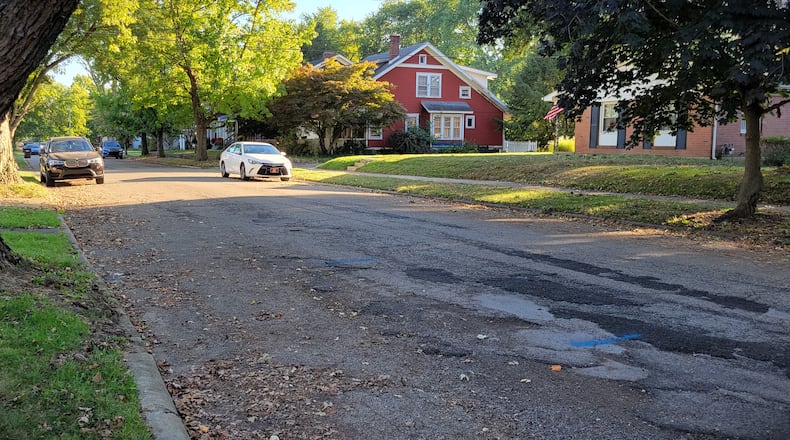The city of Xenia has a 0.24% income tax levy on the ballot that would generate approximately $2 million per year, earmarked for street maintenance and repairs.
This is one of many requests on the November ballot for property, income or sales tax increases in Butler, Warren, Montgomery, Greene, Clark and Miami counties. These include:
- An increased elderly services levy, and township fire and EMS levies, in Butler County.
- Countywide levies in Clark County, including a 0.5% sales tax increase to pay for a new county jail.
- A new public hospital levy in Dayton, and levies in local townships and villages in Montgomery County.
These ballot issues face headwinds as local officials try to convince their citizens to greenlight additional taxes. Recent property revaluations, subsequent increases in property tax, overall tax burden, and the cost of living are all top of mind for many voters.
The Dayton Daily News spoke to residents across the region who voiced a spectrum of opinions regarding upcoming tax levy requests on their November ballot.
Dern said she generally approves of initiatives that improve the quality of life in her community.
“Any kind of renewals ... things like infrastructure or that kind of thing, school board, I always vote for that,” she said.
Neighbor Gloria Hammerstrom, 18, is voting in her first election this November, and said her family has “gotten really good” at avoiding having to drive on King Street.
“If it’s going to fixing the roads, I would definitely be in favor of it,” she said of the proposed tax.
Nancy Hayslett, a retiree and nearly lifelong Clark County resident, said her vote is not impacted by property tax increases and inflation. She said she lives “within my means” and looks at local levies on a case-by-case basis when deciding whether to support them.
Other voters are more skeptical. Chris Powell, co-owner of Thousand Oaks Tattoos and Cosmetics in Springfield, said as a small business owner, he sees “taxes come out of any which way.”
“I do feel like I pay more in taxes now than I ever have,” Powell said.
While he said he will not vote no on every new tax issue simply because it is a tax, Powell will think twice about voting to increase his own tax burden.
“I feel like if it’s not something that’s directly going to affect me or the youth, I probably wouldn’t vote for it because I don’t want to pay more taxes,” Powell said.
‘They cannot afford it’
Joy Broedling, a volunteer in Warren County with the movement to abolish Ohio property taxes via constitutional amendment, has helped gather thousands of signatures since July.
She said everyone she’s talked to who has signed the petition says one thing: they’re fed up.
“They can’t believe the legislators are doing this to us. (Homeowners) cannot afford it,” she said. “I’ve had my house for 50 years, and it was very reasonable when I moved here. None of the legislation or anything they’re trying to do is geared towards the property owners.”
Property reappraisals in recent years led property owners across southwest Ohio to see spikes in their property values, leading to large tax increases for some — sometimes to the tune of hundreds of dollars.
The prospect of additional taxes on top of this unvoted increase has gotten people riled up, Broedling said.
Credit: Avery Kreemer
Credit: Avery Kreemer
“They have lost the voter base,“ she said of local cities. ”To put on a property tax or income tax on after the revaluations is just plain stupid.”
Ohio’s county auditors adjust property values every three years. The 2023 triennial reappraisal produced average countywide value increases of 37% in Butler, 30% in Greene and 34% in Montgomery counties. Another adjustment is due next year.
Clark County is currently going through the process and the county auditor is bracing property owners for a 32% average countywide value increase.
Making the case
Property tax is also a topic of furious discussion at the state level, said Bevan Schneck, director of public affairs for the Ohio Municipal League.
“Heightened cost concerns make voters more cautious. In some ways, it’s a catch-22,” Schneck said. “Residents want their properties to be valued adequately, and a vibrant community with good infrastructure can contribute to that.”
“Meanwhile, as residents face inflation in their personal budgets, they understand that local governments also face inflation when paying for infrastructure projects and the costs of providing needed community services. These are all factors voters have to take into account when considering a levy,” he added.
Despite much discussion by legislators to make changes to property tax levies, there have not been any substantial changes enacted in recent times, Schneck said.
But other, historical actions have forced local governments to rely more heavily on local property taxes. This includes cuts to the state’s local government fund, elimination of the estate tax, phasing out the tangible personal property tax, and changes to the administration of municipal income taxes.
These have all impacted municipal budgets over the last 15-20 years, he added.
“In general, the smaller the community, the more likely they are to rely upon a property tax levy, because smaller communities are less likely to have as strong of a municipal income tax base,” he said.
If cities, townships and villages are to succeed in convincing voters to invest their money, they must be transparent and demonstrate the value of their services in residents’ everyday lives, Schneck said.
“If they can make a good case that they provide a high quality of service or that infrastructure is sorely needed, they are more likely to succeed at the ballot box,” Schneck said. “We also encourage them to be as transparent with their finances as possible so that taxpayers have a strong understanding of why the funding is needed.”




